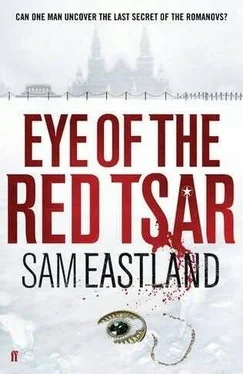“No. It was dark. I hid behind the old buildings where the mine workers lived. I waited until he climbed back in the truck and drove off. Then I started running. When I got to my cabin, I stayed there for a while. But I didn’t feel safe. I moved again. And again. Somewhere along the way, I read in the paper that the Romanovs had been executed on orders from Moscow. All nice and official. But that’s not what it looked like to me. After I read that, I realized I knew something I wasn’t supposed to know. Who can you trust after that? I kept moving, until I ended up in Vodovenko.”
“How did you end up here, Katamidze?”
“I was living on the streets in Moscow, in the sewers. Some tunnel workers found me. I don’t know how long I had been down there. It was the only place where I thought I might be safe. Do you know what that feels like, Inspector? Never feeling safe, no matter where you are?”
“Yes,” replied Pekkala. “I do.”
On the 2nd of March 1917, with riots in the streets of Petrograd and soldiers at the front in open mutiny against their officers, the Tsar gave up his power as absolute ruler of Russia.
One week later, with negotiations under way to have the Romanovs exiled to Britain, the Tsar and his family were placed under house arrest at the Tsarskoye Selo estate.
General Kornilov, the Revolutionary Commander of the Petrograd district, informed the staff at Tsarskoye Selo that they had twenty-four hours to leave. Any who chose to remain behind would be placed under the same conditions of arrest as the royal family.
Most of the staff departed immediately.
Pekkala chose to stay.
The Tsar had given him the use of a small cottage on the outskirts of the estate, not far from the horse enclosure known as the Pensioner’s Stables. It was here that Pekkala waited, with a growing sense of helplessness, for events to unfold. The confusion outside the palace gates was made worse by the fact that within the imperial household, no one seemed to have any sense of direction.
Pekkala’s only instructions, which he had received on the same day the Tsar had abdicated, had been to stand by for more orders. In this time of uncertainty, what Pekkala found most difficult was the ordinary, everyday tasks which he had once carried out so fluidly that he never gave them any thought. Things like boiling water for tea, or making his bed, or washing his clothes became suddenly monumental in their complexity. With nothing else to do, anticipation gnawed at him as he tried to imagine what events were taking place beyond the confines of his rapidly shrinking world.
Pekkala did not hear from the Tsar. Instead, he picked up fragments of gossip when he went each day to pick up rations from the kitchen.
He learned that negotiations had begun to move the Romanov family into exile in Britain. They were to sail, under armed Royal Navy escort, from the arctic port of Murmansk. At first, the Tsar had been reluctant to travel, since his children were recovering from measles. The Tsarina, fearing a long sea journey, had requested that they sail only as far as Denmark.
With crowds of armed factory workers arriving daily to jeer at the Romanovs through the gates of the Royal Estate, Pekkala knew that if the Romanovs were to escape, they would have to be smuggled out. Since no news of this plan had reached Pekkala, he came to the conclusion that he was being left behind to fend for himself.
Soon afterwards, however, he learned that the British had withdrawn their offer of asylum. From then on, until the Revolutionary Committee figured out what to do with them, the Romanovs were trapped inside their own estate.
For the sake of the children, the Tsar and Tsarina were trying to carry on as normal an existence as they could. Alexei’s tutor, Pierre Gilliard-known to the Romanovs as Zhilik-who had also chosen to remain behind, taught his daily classes in the study of French. The Tsar himself taught history and geography.
Pekkala always found the kitchen filled with off-duty guards warming up after their foot patrols around the estate. They knew who he was, and Pekkala could not help being surprised at their lack of hostility towards him. Unlike the teachers and personal servants who had stayed behind, they considered him separate from the Romanovs. His decision to remain at Tsarskoye Selo baffled them. Privately, they encouraged him to leave and even offered to help him slip out through the perimeter of guards.
The guards themselves seemed to have no clear orders about how to treat the royal family. One day, they confiscated Alexei’s toy gun. Then they gave it back. Another day, they banned the Romanovs from swimming in the Lamski Pond. Then that order was rescinded. Without clear direction, their hostility towards the Romanovs grew more open. Once, as the Tsar was bicycling around the estate, one guard jammed a bayonet into the spokes and sent the Tsar sprawling in the dust.
When he heard about that, Pekkala realized it was only a matter of time before the lives of the Romanovs would be at risk. Soon, the family would not be any safer within the confines of the estate than they were on the outside. If they didn’t leave soon, they would never leave at all, and his own life would be swallowed up along with theirs.
“I HAVE ONE LAST QUESTION FOR YOU,” PEKKALA SAID.
Katamidze raised his eyebrows.
“Why speak up now? After all these years?”
“For a while,” said Katamidze, “I knew that the only way for me to stay alive was for people to think I was crazy. So no one would believe a word I said. The trouble is, Inspector, you stay here long enough, and you really do go crazy. I wanted to tell what happened, before even I stopped believing it.”
“Are you not afraid that the man who killed the Tsar might track you down?”
“I want him to find me,” Katamidze said softly. “I am tired of living in fear.”
IT WAS LATE WHEN THEY REACHED SVERDLOVSK.
The tires of the Emka popped and rumbled over the cobblestones which paved the main street running through the town. With the night mist glistening on them, the road looked like the cast-off skin of some giant snake.
Neatly planted trees formed a barrier between the part of the street intended for horses and cars and the part set aside for people going on foot. Beyond the pedestrian walkway stood large, well-maintained houses, with gardens closed off by white picket fences and shutters bolted for the night.
Anton’s orders were to present his papers to the local police chief as soon as they arrived, but the station had closed. They decided to wait until morning.
Only the tavern was open, a low-roofed place with benches set out in front of whitewashed walls. A line of old and bearded men sat with backs slumped against the wall. Large copper mugs, each with two handles, were being passed from one man to the next. Some of the men smoked pipes, cobras of smoke rising from the pipe bowls, their faces lit by the glow. They watched the Emka drive past, eyes sharpened with suspicion.
Following Anton’s directions, Kirov steered the car into a courtyard at the back of a large two-story house. High stone walls surrounded the courtyard, obscuring any view from the outside. Pekkala could tell at a glance that no one lived here now. Paint around the window frames had flaked away; weeds grew from the gutters. The courtyard walls had once been covered with mortar and painted, but chunks had fallen, revealing the bare stones beneath. The structure seemed to radiate a hostile emptiness.
“Where are we?” asked Kirov, as he climbed out of the car.
“The Ipatiev place,” replied Anton. “What we called the House of Special Purpose.”
With a key which he took from his pocket, Anton opened the kitchen door and the three men went inside. He found a switch for electric lights and flipped it on, but the dust-covered light fixtures above him stayed dark. Hanging from nails by the door were several storm lanterns, which Kirov filled from a can of kerosene they carried in the Emka. Each man carried a lantern as they passed through the kitchen avoiding a few rickety chairs tipped over on the floor. They emerged into a hallway, with narrow-planked wooden floors and a tall ceiling, from which hung the remains of a crystal chandelier. Their shadows loomed across the walls. Ahead of them was the front door, leading out into the street, and to the left, a staircase to the second floor, its bannister thick with dust. On the right, a stone fireplace dominated the front room.
Читать дальше










